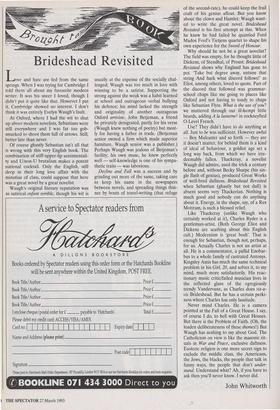Brideshead Revisited
Lye and hate are fed from the same springs. When I was trying for Cambridge I told them all about my favourite modern writer. It was his sneer I loved, though I didn't put it quite like that. However I put it, Cambridge showed no interest. I don't think it was entirely Evelyn Waugh's fault.
At Oxford, where I had the wit to shut up about modern novelists, Sebastians were still everywhere and I was far too gob- smacked to shoot them full of arrows. Still, better late than never.
Of course ghastly Sebastian isn't all that is wrong with this very English book. The combination of stiff-upper-lip sentimentali- ty and U/non-U brutalism makes a potent national cocktail. Only the English, still deep in their long love affair with the minutiae of class, could suppose that here was a great novel by a great novelist.
Waugh's original literary reputation was as satirical enfant terrible, though his wit is usually at the expense of the socially chal- lenged; Waugh was too much in love with winning to be a satirist. Supporting the strong against the weak was a habit learned at school and outrageous verbal bullying his defence; his mind lacked the strength and originality of another outrageous Oxford arriviste, John Betjeman, a friend he privately denigrated, partly for his verse (Waugh knew nothing of poetry) but most- ly for having a father in trade. (Betjeman senior owned a firm which made superior furniture. Waugh senior was a publisher.) Perhaps Waugh was jealous of Betjeman's facility; his own muse, he knew perfectly well — self-knowledge is one of his sympa- thetic traits — was laborious.
Decline and Fall was a success and by grinding out more of the same, taking care to keep his name in the newspapers between novels, and spreading things thin- ner by bouts of travel-writing (that refuge of the second-rate), he could keep the frail craft of his genius afloat. But you know about the clown and Hamlet: Waugh want- ed to write the great novel. Brideshead Revisited is his first attempt at this. When he knew he had failed he quarried Ford Madox Ford's Tietjens quartet to shape his own experience for the Sword of Honour.
Why should he not be a great novelist? The field was empty, for he thought little of Dickens, of Stendhal, of Proust. Brideshead Revisited shows why England has gone to pot. 'Take but degree away, untune that string And hark what discord follows!' as Eliot, among others, loved to quote. Part of the discord that followed was grammar- school chaps like me going to places like Oxford and not having to toady to chaps like Sebastian Flyte. What is the use of you? we muttered through our ill-kempt little beards, adding A la lanteme! in cockneyfied 0-Level French.
Use? They didn't have to do anything at all. Just to be was sufficient. However awful — Boy Mulcaster and so forth — they are it doesn't matter, for behind them is a kind of ideal of behaviour, a golden age set a long way back, from which we have irre- deemably fallen. Thackeray, a novelist Waugh did admire, used the trick a century before and, without Becky Sharpe (his sin- gle flash of genius), produced Great Works of well-bred dullness. Brideshead Revisited when Sebastian (ghastly but not dull) is absent seems very Thackerian. Nothing is much good and nobody can do anything about it. Energy, in the shape, say, of a Rex Mottram, is such a blessed relief.
Like Thackeray (unlike Waugh who certainly worked at it), Charles Ryder is a gentleman-artist. (Both George Eliot and Dickens are scathing about this English cult.) Modernism is 'great bosh'. That is enough for Sebastian, though not, perhaps, for us. Actually Charles is not an artist at all. He is a commentator, a pallid Enobar- bus to a whole family of castrated Antonys. Kingsley Amis has much the same technical problem in his Girl, 20, and solves it, to my mind, much more satisfactorily. His reac- tionary music critic/failed musician lives in the reflected glare of the egregiously trendy Vandervane, as Charles does vis-a- vis Brideshead. But he has a certain perki- ness where Charles has only lassitude.
Never mind Charles. He is a camera pointed at the Fall of a Great House. I say, of course I do, to hell with Great Houses. But there is the Problem of Faith. (Oh, the leaden deliberateness of these themes!) But Waugh has nothing to say about God. The Catholicism on view is like the masonic rit- uals in War and Peace, exclusive daftness. Esoteric religion is one more secret sign to exclude the middle class, the Americans, the Jews, the blacks, the people that talk in funny ways, the people that don't under- stand. Understand what? Ah, if you have to ask then you'll never know. I never did.
John Whitworth


























































 Previous page
Previous page